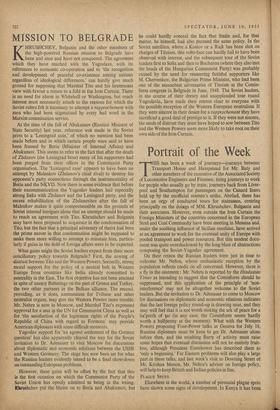MISSION TO BELGRADE
KHRUSHCHEV, Bulganin and the other members of the high-powered Russian mission to Belgrade have been and seen and have not conquered. The agreement which they have reached with the Yugoslays, with its references to economic co-operation and to 'the recognition and development of peaceful co-existence among nations regardless of ideological differences,' can hardly give much ground for supposing that Marshal Tito and his lieutenants view with favour a return to a fold in the Iron Curtain. There is no need for alarm in Whitehall or Washington, but much interest must necessarily attach to the reasons for which the Soviet rulers felt it necessary to attempt a rapprochement with men who had been stigmatised by every bad word in the Marxist commination service.
At the time of the fall of Abakumov (Russian Minister of State Security) last year, reference was made in the Soviet press to a 'Leningrad case,' of which no mention had been made before and in which certain people were said to have been framed by Beria (Minister of Internal Affairs) and Abakumov. This seems to refer to the fact that after the death of Zhdanov (the Leningrad boss) many of his supporters had been purged from their offices in the Communist Party organisation. The 'Leningrad case' appears to have been an attempt by Malenkov (Zhdanov's chief rival) to destroy his opponent's party connections through the instrumentality of Iieria and the NKVD. Now there is some evidence that before their excommunication the Yugoslav leaders had especially strong links with Zhdanov and the Leningrad party, and the recent rehabilitation of the Zhdanovites after the fall of Malenkov makes it quite comprehensible on the grounds of Soviet internal intrigues alone that an attempt should be made to reach an agreement with Tito. Khrushchev and Bulganin may have been prepared to acquiesce in the condemnation of Tito, but the fact that a principal adversary of theirs had been the prime mover in that condemnation might be supposed to make them more willing to attempt to reinstate him, particu- larly if gains in the field of foreign affairs were to be expected.
What gains might the Soviet leaders expect from their more conciliatory policy towards Belgrade? First, the sowing of distrust between Tito and the Western Powers. Secondly, strong moral support for the policy of a neutral belt in Western Europe from countries like India already committed to neutrality in the East. The first objective has not been attained in spite of uneasy flutterings on the part of Greece and Turkey, the two other partners in the Balkan alliance. The second. providing, as it does, ammunition for Tribune and other neutralist organs, may give the Western Powers more trouble. Mr. Nehru is now in Moscow. and Marshal Tito's expressed approval for a seat in the UN for Communist China as well as for `the satisfaction of the legitimate rights of the People's Republic of China with regard to Formosa' may provide American diplomats with some difficult moments.
Yugoslav support for .`an agreed settlement of the German question' has also apparently cleared the way for the Soviet invitation to Dr. Adenauer to visit Moscow for discussions about diplomatic and economic relations between the USSR and Western Germany. The stage has now been set for what the Russian leaders evidently intend to be a final show-down on outstanding European problems. he could hardly conceal the fact that Stalin and, for that matter, he himself, had also pursued the same policy. In the Soviet satellites, where a Kostov or a Rajk has been shot on charges of Titoism. this volte-face can hardly fail to have been observed with interest, and the subsequent tour of the Soviet leaders first to Sofia and then to Bucharest (where they also met the heads of the Hungarian Communist Party) was probably caused by the need for reassuring faithful supporters like M. Chervenkov, the Bulgarian Prime ,Minister, who had been one of the staunchest adversaries of Titoism at the Comin- form congress in Belgrade in June, 1948. The Soviet leaders, in the course of their dreary and unapplauded tour round Yugoslavia, have made their retreat clear to everyone with the possible exception of the Western European neutralists. If they were sincere in their desire for a rapprochement they have sacrificed a good deal of prestige to it. If they were not sincere, the seeds of distrust they must have hoped to sow between Tito and the Western Powers seem more likely to take root on their own side of the Iron Curtain.










































 Previous page
Previous page